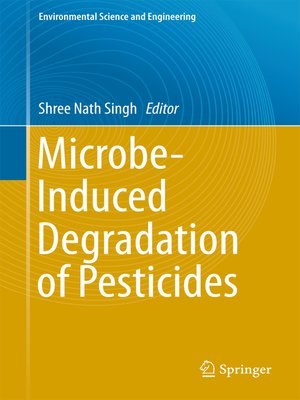Microbe-Induced Degradation of Pesticides
ebook ∣ Environmental Science and Engineering
By Shree Nath Singh

Sign up to save your library
With an OverDrive account, you can save your favorite libraries for at-a-glance information about availability. Find out more about OverDrive accounts.
Find this title in Libby, the library reading app by OverDrive.



Search for a digital library with this title
Title found at these libraries:
| Library Name | Distance |
|---|---|
| Loading... |
This book focuses on the microbial degradation of endosulfan, lindane, chlorophenols, organochlorine, aldrin, dieldrin, isoproturon and atrazine, etc. which are commonly used in crop fields to kill the pests. Further, it illustrates the role of degradative enzymes, metabolic pathways of degradation, toxicity of metabolites, and the factors regulating the pesticide degradation.
In view of persistence of synthetic pesticides, scientists have discovered suitable microbes, such as bacteria, fungi and algae (naturally occurring or genetically engineered) over the years. After successful trials under laboratory and field conditions, these microbes are being used to degrade chemical pesticides in agriculture. As of now 2.56 billion kg of chemical pesticides is used every year to protect agricultural fields against pest attack. These technologies have been found to be highly effective, eco-friendly and cost-effective without disturbing the agro-ecosystems.
As this book contains review articles contributed by various researchers from different countries whose work demonstrates recent advances in microbial degradation of pesticides, it will serve as a ready reckoner and also a valuable quick reference guide for scientists, academicians, cultivators and industrialists alike.







